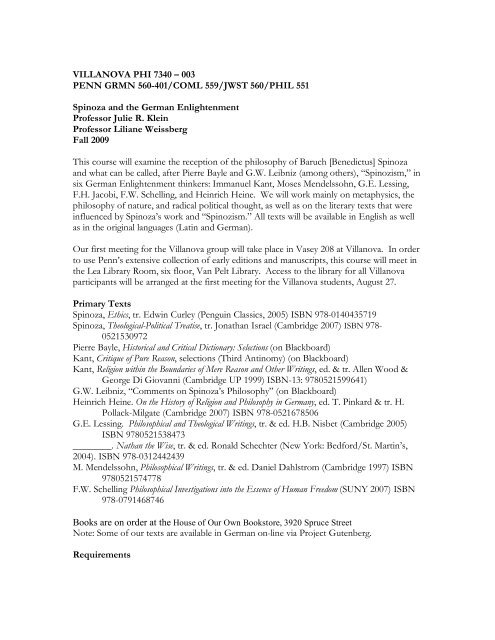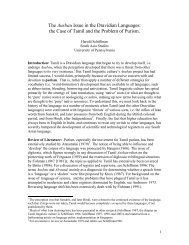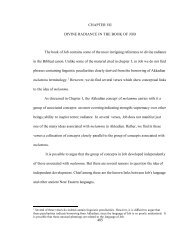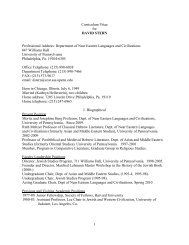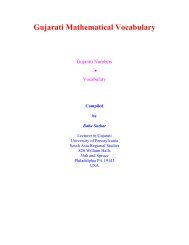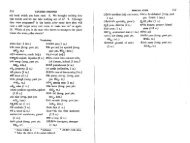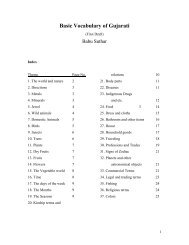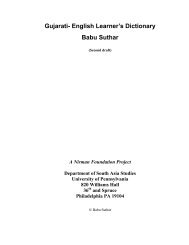Spinoza and the German Enlightenment Syllabus
Spinoza and the German Enlightenment Syllabus
Spinoza and the German Enlightenment Syllabus
You also want an ePaper? Increase the reach of your titles
YUMPU automatically turns print PDFs into web optimized ePapers that Google loves.
VILLANOVA PHI 7340 – 003<br />
PENN GRMN 560-401/COML 559/JWST 560/PHIL 551<br />
<strong>Spinoza</strong> <strong>and</strong> <strong>the</strong> <strong>German</strong> <strong>Enlightenment</strong><br />
Professor Julie R. Klein<br />
Professor Liliane Weissberg<br />
Fall 2009<br />
This course will examine <strong>the</strong> reception of <strong>the</strong> philosophy of Baruch [Benedictus] <strong>Spinoza</strong><br />
<strong>and</strong> what can be called, after Pierre Bayle <strong>and</strong> G.W. Leibniz (among o<strong>the</strong>rs), “Spinozism,” in<br />
six <strong>German</strong> <strong>Enlightenment</strong> thinkers: Immanuel Kant, Moses Mendelssohn, G.E. Lessing,<br />
F.H. Jacobi, F.W. Schelling, <strong>and</strong> Heinrich Heine. We will work mainly on metaphysics, <strong>the</strong><br />
philosophy of nature, <strong>and</strong> radical political thought, as well as on <strong>the</strong> literary texts that were<br />
influenced by <strong>Spinoza</strong>’s work <strong>and</strong> “Spinozism.” All texts will be available in English as well<br />
as in <strong>the</strong> original languages (Latin <strong>and</strong> <strong>German</strong>).<br />
Our first meeting for <strong>the</strong> Villanova group will take place in Vasey 208 at Villanova. In order<br />
to use Penn’s extensive collection of early editions <strong>and</strong> manuscripts, this course will meet in<br />
<strong>the</strong> Lea Library Room, six floor, Van Pelt Library. Access to <strong>the</strong> library for all Villanova<br />
participants will be arranged at <strong>the</strong> first meeting for <strong>the</strong> Villanova students, August 27.<br />
Primary Texts<br />
<strong>Spinoza</strong>, Ethics, tr. Edwin Curley (Penguin Classics, 2005) ISBN 978-0140435719<br />
<strong>Spinoza</strong>, Theological-Political Treatise, tr. Jonathan Israel (Cambridge 2007) ISBN 978-<br />
0521530972<br />
Pierre Bayle, Historical <strong>and</strong> Critical Dictionary: Selections (on Blackboard)<br />
Kant, Critique of Pure Reason, selections (Third Antinomy) (on Blackboard)<br />
Kant, Religion within <strong>the</strong> Boundaries of Mere Reason <strong>and</strong> O<strong>the</strong>r Writings, ed. & tr. Allen Wood &<br />
George Di Giovanni (Cambridge UP 1999) ISBN-13: 9780521599641)<br />
G.W. Leibniz, “Comments on <strong>Spinoza</strong>’s Philosophy” (on Blackboard)<br />
Heinrich Heine. On <strong>the</strong> History of Religion <strong>and</strong> Philosophy in <strong>German</strong>y, ed. T. Pinkard & tr. H.<br />
Pollack-Milgate (Cambridge 2007) ISBN 978-0521678506<br />
G.E. Lessing. Philosophical <strong>and</strong> Theological Writings, tr. & ed. H.B. Nisbet (Cambridge 2005)<br />
ISBN 9780521538473<br />
________. Nathan <strong>the</strong> Wise, tr. & ed. Ronald Schechter (New York: Bedford/St. Martin’s,<br />
2004). ISBN 978-0312442439<br />
M. Mendelssohn, Philosophical Writings, tr. & ed. Daniel Dahlstrom (Cambridge 1997) ISBN<br />
9780521574778<br />
F.W. Schelling Philosophical Investigations into <strong>the</strong> Essence of Human Freedom (SUNY 2007) ISBN<br />
978-0791468746<br />
Books are on order at <strong>the</strong> House of Our Own Bookstore, 3920 Spruce Street<br />
Note: Some of our texts are available in <strong>German</strong> on-line via Project Gutenberg.<br />
Requirements
Class attendance <strong>and</strong> participation; one research paper. We will also use <strong>the</strong> Blackboard site<br />
to post material <strong>and</strong> fur<strong>the</strong>r discussion.<br />
Schedule<br />
First meeting for Villanova students on August 27, 2007 with Professors Klein & Weissberg<br />
Thursday 9/10<br />
Introduction<br />
<strong>Spinoza</strong>, Letter 19 (to be distributed in class)<br />
Thursday 9/17<br />
<strong>Spinoza</strong>, Theologico-Political Treatise Preface & Ch. 1-6<br />
Thursday 9/24<br />
<strong>Spinoza</strong>, TTP Ch. 7-8, 11-13, 20<br />
(Thursday 10/1 rescheduled to Fri 10/9)<br />
Thursday 10/8<br />
<strong>Spinoza</strong>, Ethics Part 1, Letter 32<br />
Friday 10/9<br />
<strong>Spinoza</strong>, Ethics Part 2 through <strong>the</strong> “Physical Digression”; Part 3 Preface, Part 5<br />
Thursday 10/15<br />
Leibniz, “Comments on <strong>Spinoza</strong>’s Philosophy” <strong>and</strong> o<strong>the</strong>r texts; Bayle, Historical <strong>and</strong> Critical<br />
Dictionary entry on <strong>Spinoza</strong>; Kant, “Third Antinomy” from <strong>the</strong> Critique of Pure Reason Kant,<br />
“Idea for a Universal History with a Cosmopolitan Purpose” (texts posted on Blackboard)<br />
(Thursday 10/22 rescheduled to Friday 11/6)<br />
Thursday 10/29<br />
Kant, Religion within <strong>the</strong> Boundaries of Mere Reason<br />
Thursday 11/5<br />
Lessing, “The reality of things outside G’d”; “<strong>Spinoza</strong> only put Leibniz on <strong>the</strong> track of preestablished<br />
harmony”; “On <strong>the</strong> origin of revealed religion”<br />
Jacobi, from On <strong>the</strong> Doctrine of <strong>Spinoza</strong> in Letters to Mr. Moses Mendelssohn<br />
Friday 11/6<br />
Lessing, “A Parable”; Nathan <strong>the</strong> Wise<br />
Thursday 11/12<br />
Guest lecture<br />
Thursday 11/19
Mendelssohn, “On <strong>the</strong> ability to know, <strong>the</strong> ability to feel, <strong>the</strong> ability to desire”; “On evidence<br />
in metaphysical sciences”; Preface to <strong>the</strong> Morning Hours<br />
Thanksgiving Break<br />
Thursday 12/3<br />
Schelling, Philosophical Investigations into <strong>the</strong> Essence of Human Freedom<br />
Thursday 12/10<br />
Heine, On <strong>the</strong> History of Religion <strong>and</strong> Philosophy in <strong>German</strong>y<br />
Select Recommended Secondary Literature<br />
[Anonymous]. The Treatise of <strong>the</strong> Three Impostors, tr. A. Anderson (Rowman & Littlefield 1997)<br />
Altmann, A. “Moses Mendelssohn on Leibniz <strong>and</strong> <strong>Spinoza</strong>.” In Studies on Rationalism, Judaism<br />
<strong>and</strong> Universalism, ed. R. Loewe (London: Routledge Keegan Paul, 1966)<br />
Beiser, Frederick. The Fate of Reason. <strong>German</strong> Philosophy from Kant to Fichte (Harvard 1987)<br />
Bloch, Olivier, ed. <strong>Spinoza</strong> au XVIIIe siècle (Paris: Méridiens Klinksieck, 1989)<br />
Goetschel, Willi. <strong>Spinoza</strong>’s Modernity. Mendelssohn, Lessing, <strong>and</strong> Heine (Wisconsin 2004)<br />
Henrich, Dieter. Between Kant <strong>and</strong> Hegel. Lectures on <strong>German</strong> Idealism (Harvard 2003)<br />
Israel, Jonathan. Radical <strong>Enlightenment</strong>. Philosophy <strong>and</strong> <strong>the</strong> Making of Modernity, 1650-1750<br />
(Oxford 2001)<br />
Moreau, Pierre-François. “<strong>Spinoza</strong>’s Reception <strong>and</strong> Influence.” In The Cambridge Companion to<br />
<strong>Spinoza</strong>, ed. Don Garrett (Cambridge UP 1996), 408-433<br />
Pinkard, Terry. <strong>German</strong> Philosophy 1760-1860: The Legacy of Idealism (Cambridge 2002)<br />
Schürmann, Eva et al., ed. <strong>Spinoza</strong> im Deutschl<strong>and</strong> de 18. Jahrhundert (Stuttgart-Bad<br />
Cannstatt: frommann-holzboog 2002)<br />
Smith, Steven B. <strong>Spinoza</strong>, Liberalism <strong>and</strong> <strong>the</strong> Question of Jewish Identity (Yale 1997)<br />
Tosel, André. et al., ed. <strong>Spinoza</strong> au XIXe siècle (Paris: Publications de la Sorbonne, 2007)<br />
Vallée, Gerard. The <strong>Spinoza</strong> Conversations between Lessing <strong>and</strong> Jacobi: Text with Excerpts from <strong>the</strong><br />
Ensuing Controversy (University Press of America, 1988)<br />
Zac, Sylvain. <strong>Spinoza</strong> en Allemagne: Mendelsson, Lessing, et Jacobi (Paris: Méridiens Klinksieck,<br />
1989)<br />
Contact Information<br />
Liliane Weissberg’s office hours are Thursdays, 2-4pm, 747 Williams Hall, University of<br />
Pennsylavania. Email is lweissbe@sas.upenn.edu<br />
Julie Klein’s office hours are Mondays, 5:30-6:15pm <strong>and</strong> Wednesdays 2:45-4:00pm, 175 St.<br />
Augustine Center, Villanova University. Email is Julie.klein@villanova.edu


